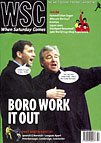The crisis at Port Vale took a an unexpected twist over the holiday period, when controversial director Charles Machin resigned amid an acrimonious exchange of views with chairman and major shareholder Bill Bell, hitherto seen as a staunch ally. Vale had already made headlines this season thanks to Machin’s bizarre demand of manager Brian Horton that he fill in regular questionnaires on each player, and had also admitted they were using their yellow away strip more frequently because they could not afford to replace the home kit if it wore out. Other festering sores include the ungracious sacking of John Rudge in 1999 (and legal aftermath) and the club’s long-standing failure to complete the Lorne Street Stand at Vale Park.
Bell had threatened to close the club down but, while claiming he would welcome new investment, refused to name his price to sell his stake. Just before Christmas, Machin says, he had put together a Manchester-based consortium to buy a controlling interest in the club, but Bell failed to turn up to a meeting on December 22 to discuss their offer. In a statement following his subsequent resignation, Machin said: “At about 11.20pm on the Friday night after getting home from the match I received a telephone call from Mrs Bell, the chairman's wife, who was very agitated and told me to ‘shut my mouth’ about buying the club. Understandably, I was taken aback.”
Machin’s consternation increased when Bell issued his own statement criticising “people [who] interfere in football and don’t know all the ins and outs” and taking issue with Machin’s views on bringing in foreign players. “He doesn’t know what he’s talking about,” Bell said. As a result of these events, Machin quit the board, though he says he is still interested in discussing a takeover.
Good news and bad news for Carlisle United. The good news is that (at the time of going to press) a consortium led by Scottish businessman Stephen Brown seems set to buy Michael Knighton’s CUFC Holdings Ltd, which owns 93 per cent of the club. That might mean the end of Knighton’s “idiosyncratic” stewardship of the club. On the other hand, the new group does not sound instantly reassuring.
For one thing, the main force behind the consortium is a company called Mancarr Investments, described in the local press as “a Gibraltar-registered property company”. For another, names of new people they might like to bring on to the board have already been bandied around. One is a promising young lad by the name of Mark Knighton.
Intriguingly, Brown previously worked at Scottish non-League club Gala Fairydean, which was one of the mooted new locations for Clydebank in their darkest and maddest days of 1999 (see WSC 134 and 148). Another, of course, was Carlisle. Nothing sinister in that, no doubt, but you could forgive both Clydebank and Carlisle fans for being paranoid. Happily, it seems Bankies are about to be bought by a group of businessmen headed by one David McGhie, ending a spell in administration and the nightmare of a succession of owners, each more eccentric than the last.
The recent floods which submerged Gay Meadow have only increased the frustration of Shrewsbury Town fans at the failure of plans for a new 10,000 capacity ground at Meole Brace. Gay Meadow may be one of the prettiest grounds in the league, but it’s of limited use to Town since its location makes it impossible to redevelop and they are restricted by covenant to trading only on match days. And that’s when it’s not under three feet of water. The problem lies not so much with the new stadium itself as the construction next door of 232 houses which would fund it, since the land is designated as countryside. Although the club have argued that their needs make it an exceptional case, the plans were withdrawn by the developer Alaska in December after they claimed the council was set on rejecting them before they had been given a fair hearing.
More ground worries too for Chesterfield, whose Saltergate stadium was threatened with closure on three sides at the end of 2000 by the Football Licensing Authority (see WSC 167). At the time of going to press the club were confident a compromise deal would be worked out which would enable them to keep some of the current terracing open while one end is brought up to scratch. And then the search for a new stadium site starts all over again.
From WSC 168 February 2001. What was happening this month
